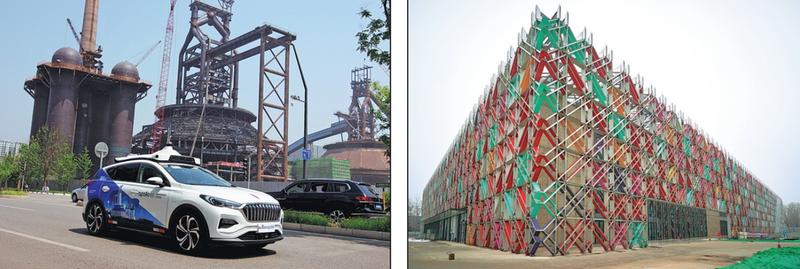 Electric cars and energy-saving venues are just some of the green highlights of the 2022 Winter Olympic Games, which will open next February in Beijing and Zhangjiakou, Hebei province. (LU LIN / DU JIANPO / FOR CHINA DAILY)
Electric cars and energy-saving venues are just some of the green highlights of the 2022 Winter Olympic Games, which will open next February in Beijing and Zhangjiakou, Hebei province. (LU LIN / DU JIANPO / FOR CHINA DAILY)
Beijing's green preparations for the 2022 Winter Olympics are on course to leave a legacy in low-carbon urban development, with the use of clean energy and sustainable venues setting the standard.
Two years since unveiling their master plan for carbon neutralization, Beijing 2022 organizers have already seen their vision for energy conservation and carbon-emission reductions materialize on all fronts. Now it's hoped these innovations will help guide the region's future sustainable development.
The implementation of a series of proposals was outlined at a media conference on Wednesday in Beijing. The plans cover areas such as energy supply, venue and transportation, and carbon management, with the latter measures originally unveiled in 2019 and already taking effect at Games facilities, city infrastructure and nature reserves.
The 2022 Olympics will be the first Games in history to power all venues solely with clean energy from renewable sources, according to the organizing committee. Solar and wind power, for example, will be generated in the Zhangbei area of Hebei province
"Our efforts trying to achieve carbon neutralization for the 2022 Winter Olympics and beyond have extended and transcended Beijing's commitment made before the 2008 Summer Games to host green Olympics," said Li Sen, director of Beijing 2022's general planning department.
"These measures and proposals, as evidenced by the implementation effects so far, will have a long-term and profound impact on our everyday lives way beyond the duration of the Games."
ALSO READ: Beijing aiming for green, safe 2022 Winter Olympics
The 2022 Olympics will be the first Games in history to power all venues solely with clean energy from renewable sources, according to the organizing committee. Solar and wind power, for example, will be generated in the Zhangbei area of Hebei province.
The reuse of five venues built for the 2008 Summer Games to host competitions and ceremonies in 2022 has earned glowing praise from the International Olympic Committee.
The adoption of new technologies, highlighted by the use of carbon dioxide as a clean refrigerant at four Beijing 2022 ice sports competition and training centers, and the use of recycled construction materials at newly built venues, such as the National Speed Skating Oval, have significantly reduced energy consumption, waste discharge and carbon emissions, according to the organizing committee's venue planning and construction department.
"More importantly, these innovations will also apply to the development of new buildings and future sports facilities on our doorsteps as part of the Games' legacy," said Liu Yumin, director of the department.
"The impact of a sustainable Olympics can be felt, experienced and enjoyed."
Beijing 2022 predicts that the use of green power, facilitated by efficient, low-energy operations, at all venues during the Games, will help cut CO2 emissions by 320,000 tons, while offsetting the burning of 128,000 tons of coal.
In another Olympic first, Beijing 2022, supported by scholars in architecture and ecological preservation, have developed a set of green evaluation standards to inspect and guide the construction and renovation of all the Games' outdoor snow sports venues in Yanqing and Zhangjiakou.
The standards, which scrutinize the recycling of snow-making water, vegetation protection and mountain venues' impact on wildlife, are the first of their kind internationally, and will play a major role in the development of eco-friendly skiing and mountain tourism in the region, according to Liu.
Spectators at the Games will be encouraged to travel by public transport across the three competition zones-downtown Beijing, its suburban Yanqing district and co-host Zhangjiakou in Hebei province-which have been connected by an electric-powered high-speed railway that began operation in late 2019.
All passenger vehicles used on the Games' official transport service will be powered by renewable energy. Charging stations and hydrogenation stations will be installed for official vehicles in competition zones, according to the plan.
Clean-energy shuttles will be available to connect high-speed railway stations and spectator parking lots to all the venues.
READ MORE: 500-day countdown to 2022 Winter Olympics celebrated
In addition, Beijing 2022 has released a WeChat mini program to encourage and guide the public to practice a green and low-carbon lifestyle, allowing users to record their low-carbon contributions.


